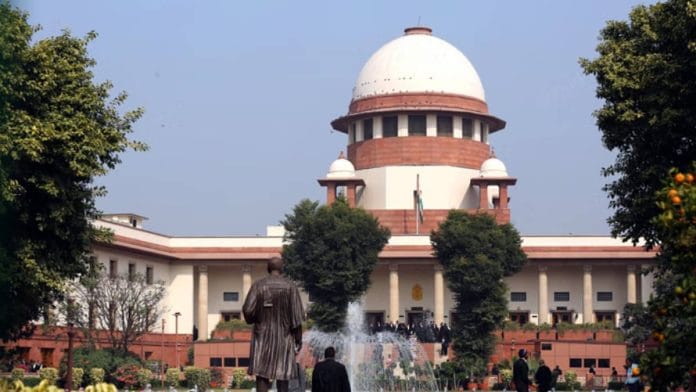New Delhi: The Supreme Court, in a significant relief to women entangled in matrimonial proceedings, has held that a woman need not pay registration charges for a house given to her by her husband as part of a divorce settlement.
The judgment declared that such a property would come under those provisions of the Registration Act, 1908, that exclude registration fees for properties whose ownerships are settled through a court order.
Notably, a bench of justices Vikram Nath and Sandeep Mehta delivered the judgment invoking Article 142 of the Constitution, which gives the Supreme Court the power to make orders that ensure “complete justice” in a pending case. This power is discretionary and can be used to enforce decrees, orders and secure attendance, among other things. Using this Article, the top court can issue directives on subjects that may not be directly before it but are related to the dispute that is being heard.
In the present case, the bench of justices Nath and Mehta was hearing a transfer petition, filed by a husband, requesting the top court to transfer the divorce case initiated by his wife from the family court in Bandra, Mumbai to Delhi’s family court in Karkardooma court complex. This was in line with the existing law that requires the Supreme Court’s nod to transfer a case, both civil and criminal, from one territorial jurisdiction to another.
However, during the proceedings, the bench referred the matter for mediation, advising the couple to amicably settle the dispute. Following this, the couple resolved their differences and accordingly filed an application under Article 142 before the top court to dissolve their marriage through mutual consent. This saved them from going back to the trial court where the couple was contesting the case.
The only bone of contention that was left between the two parties was a flat in Kalyan, with each having their own version regarding the source of funds utilised for acquiring the immovable property. Finally, the husband relinquished his rights in the flat in favour of his wife, who, in return, agreed not to demand any alimony from him.
It was then that the court was faced with the legal question of whether the wife could register the flat in her name without paying the stamp duty. For this, the court interpreted Section 17(2)(vi) of The Registration Act, 1908.
Section 17 of the law outlines the documents related to immovable property for which registration is compulsory. As per clauses (b) and (c) of Section 17’s sub-section (1), non-testamentary instruments, which create or vest, limit or extinguish an interest in a property, need to be registered.
However, its sub-section (2) is an exclusionary provision that exempts certain documents from registration, one of which pertains to a property that is part of a settlement deed ordered by the court. However, if the compromise is made on a property that was not a subject matter of a suit or proceeding, then the said immovable property would require payment of stamp duty during registration.
The bench quoted a 2024 judgment of the Supreme Court that propounded the above-mentioned interpretation of Section 17(2)(vi) and observed that the flat in question is a subject matter of the compromise and, as a consequence, forms part of a proceeding before it.
Hence, the exclusion provided by Section 17(2)(vi) of the Registration Act, 1908 will apply, and the registration of the flat in question in the exclusive name of the wife would be exempted from the payment of stamp duty, the bench said, as it directed the sub-registrar of the area where the flat is located to register the property in the exclusive name of the wife.
The judgment will have far-reaching implications for women who often face financial hardships while contesting matrimonial disputes, as it reduces the burden on them in cases where they acquire ownership of an immovable residential property as part of a divorce settlement.
(Edited by Radifah Kabir)
Also Read: Despite 3 SC orders, Bihar, Jharkhand owe employees of undivided Bihar Rs 500 cr. Inside 25-yr feud






